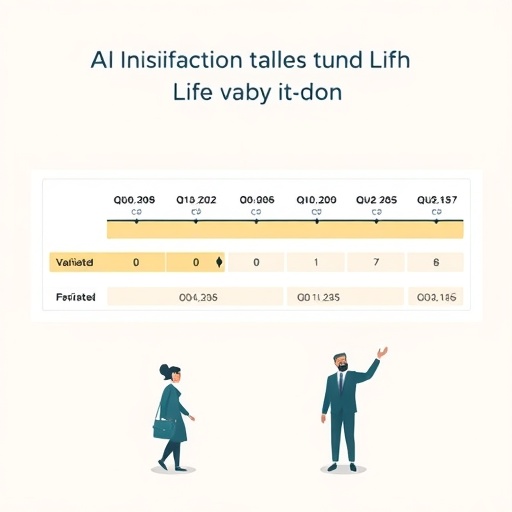In a groundbreaking development at the intersection of artificial intelligence and psychological assessment, researchers have unveiled a Turkish life satisfaction scale meticulously crafted and validated through advanced AI methodologies. This pioneering work not only leverages the computational power of artificial intelligence to construct a nuanced psychological instrument but also rigorously examines its validity and reliability, heralding a new era for culturally adapted mental health metrics.
Life satisfaction, a pivotal construct within positive psychology, encapsulates how individuals cognitively evaluate the overall quality of their lives based on personal criteria. Accurately measuring this subjective metric has been a longstanding challenge due to cultural nuances and language-specific semantics that traditional psychometric tools often fail to capture. By introducing an AI-driven framework, the new scale promises to transcend conventional barriers, tailoring evaluations uniquely to the Turkish sociocultural context with enhanced precision and sensitivity.
The core innovation lies in the algorithmic design phase, where machine learning models sifted through extensive linguistic datasets and psychological literature to identify lexicons, syntactic structures, and semantic patterns emblematic of life satisfaction expressions among Turkish speakers. Unlike traditional scale development reliant on human experts alone, this hybrid approach synthesizes AI-generated insights with expert feedback to ensure both linguistic authenticity and psychological relevance.
Subsequent validation involved administering the AI-developed scale to a heterogeneous cohort representative of the Turkish population, encompassing diverse demographics such as age, gender, socioeconomic status, and regional backgrounds. The psychometric properties were then rigorously quantified, including measures of internal consistency, construct validity, and test-retest reliability. The findings confirmed that the AI-assisted tool exhibits robust reliability coefficients comparable to, or exceeding, those of existing standardized measures.
A particularly notable aspect of this research is its methodological transparency and reproducibility. Unlike many proprietary AI applications shrouded in algorithmic opacity, the study delineates each computational procedure used — from natural language processing techniques to supervised learning algorithms — enhancing trustworthiness and providing a blueprint for future cross-cultural scale developments.
This AI-based approach also addressed semantic ambiguities and dialectal variations inherent in the Turkish language, which often confound traditional psychometric assessments. The dynamic adaptability of machine learning models enabled iterative refinement of item wording, optimizing clarity and cultural resonance, a feat difficult to achieve via conventional methods. This advancement underlines AI’s potential to revolutionize language-sensitive psychological measurement tools globally.
Moreover, the researchers underscored the scale’s applicability not only for academic investigations but also for clinical and community mental health interventions. Tools that reliably gauge life satisfaction can guide policy-makers and practitioners in identifying populations at risk of diminished well-being and tailoring programs to enhance quality of life, thereby amplifying AI’s societal impact beyond theoretical confines.
While the immediate focus remains on Turkish speakers, the methodology establishes a versatile template for developing validated life satisfaction scales in other languages and cultural milieus. It paves the way for more inclusive, contextually aware psychological metrics that accommodate linguistic diversity instead of relying on blunt translations of Western-oriented instruments.
The study also initiates discourse on the ethical dimensions of deploying AI in psychological assessment. Issues such as data privacy, algorithmic bias, and the need for human oversight are critically examined to safeguard fairness and respect for individuals’ psychological data. This balanced perspective shores up confidence in AI-augmented mental health tools amid growing public scrutiny of automated technologies.
Complementing the psychometric rigor, the research integrates cognitive theories underpinning life satisfaction, such as the tripartite model involving affective, cognitive, and behavioral components. The AI algorithms were designed to reflect these multidimensional aspects, ensuring the scale captures the complexity of subjective well-being in a manner congruent with cutting-edge psychological paradigms.
The work also highlights the scalability and efficiency gains imparted by AI. Developing and validating such an instrument traditionally demands labor-intensive processes spanning years. The integration of AI accelerated item generation, analysis, and refinement phases, enabling rapid iteration cycles and cost-effective deployment without compromising scientific standards.
Furthermore, by harnessing AI’s prowess in big data analytics, the researchers explored latent patterns and inter-item relationships previously obscured in manual analyses. These insights enriched scale construction, fostering a more granular and structurally sound measurement framework that accommodates subtle life satisfaction fluctuations within the population.
Engagement with stakeholders, including clinical psychologists, linguists, and end-users, was pivotal in enhancing the scale’s practical relevance and user-friendliness. This participatory approach harmonizes human intuition with machine intelligence, producing an assessment tool that resonates authentically with those it intends to serve.
Looking forward, the implications of AI-informed psychological scale development extend beyond individual measures like life satisfaction. This research heralds a paradigm shift wherein digital intelligence synergizes with human expertise to reshape mental health diagnostics, personalized intervention strategies, and longitudinal monitoring of well-being trajectories across cultures.
In summary, the validity and reliability analysis of the Turkish life satisfaction scale — innovatively developed through artificial intelligence — represents a seminal advance in psychological measurement. It exemplifies how computational intelligence can complement human insight to create culturally attuned, psychometrically robust instruments. As mental health gains prominence globally, such interdisciplinary breakthroughs fortify our capacity to assess and enhance life satisfaction with unprecedented accuracy and empathy.
Article References:
Ati̇k, S., Erdemi̇r, N. Validity and reliability analysis of the Turkish life satisfaction scale developed through artificial intelligence. BMC Psychol 13, 1139 (2025). https://doi.org/10.1186/s40359-025-03246-2
Image Credits: AI Generated




